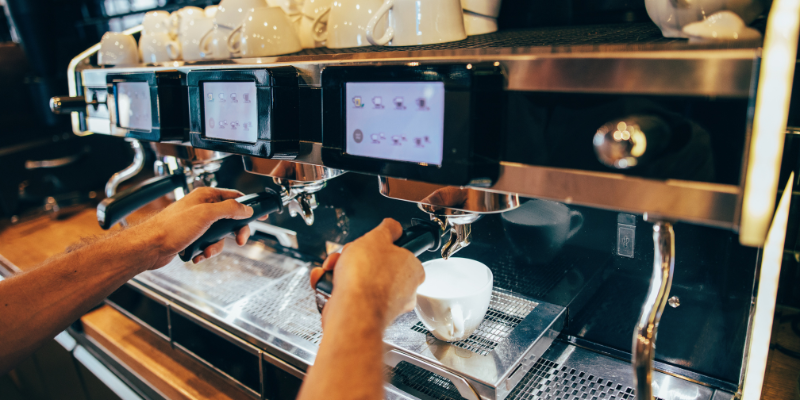Over a decade we have travelled around Europe in search for the best specialty cafe to feature in our guides and mobile apps. What started with a handful specialty cafes in major cities is now a huge database of specialty coffee spots spread across the continent. Yeah, drinking specialty coffee is popular now, but with demand, requirements for cafe operators increased substantially.
Here is the thing - cafes are getting busier and busier, and what was once the artisanal approach is now an enormous pressure on baristas to perform in high-volume environment. It’s more demanding than ever to maintain high quality and consistency while keeping the hospitable approach. That is when the technology came in and changed how specialty cafes organise their bars, workflow and train their baristas. It’s a waste of resources not to consider at least some benefits of current technology.
1 - Automating Repetitive Barista Tasks
Making the specialty coffee-level drinks has always been a challenging task for baristas. Achieving tasty espresso shots and brews every time requires skill, precision and consistency. There are many small steps and possible mistakes one can make in the process. If we can automate some of the tasks, then baristas can focus on the most important goal, making guests feel great while enjoying coffee.
Specialty coffee bar setup has changed a lot over the past decade. Instead of tamping, cafes use PUQpress. Integrated scales in grinders and espresso machines removed the need to constantly weigh portafilters. The auto rinse features make baristas faster and cleaning easier. Milk dispensers like MilkPal produce textured milk in exact quantities to reduce waste and improve consistency.
For every cafe operator, it’s about finding the right balance between the technology available and the barista skills needed to achieve their cafe success goals.

2 - Filter Coffee On Demand With Ease
The growth of specialty coffee popularity cause the rise of filter coffee as a favourite item on the cafe menus around Europe. Where’s it all started as a simple hand brewed coffee a decade ago, most cafes couldn’t cope with the demand and opted for more convenient batch-brew machines that can produce several litres of filter coffee at once.
Still having a chance to brew a cup of coffee on demand based on the customer order is a way to push specialty coffee offering forward and allow customers a personal choice.
As the “bach brew” is becoming an average way to drink filter coffee, some specialty cafes proudly keep their hand brew offer. A benefit of both worlds is unlocked by technology with modern machines that allow baristas to preset the recipes for each coffee in advance and then automate the brewing process in the rush of busy cafes. Consistency increased, labour costs were reduced, and customers could still enjoy coffee brewed just for them!
3 - Advanced Espresso Machines & Grinders
The espresso machine is a cornerstone of every coffee shop. Often, the whole coffee bar and cafe interior is built around it. The design is a very important decision-making factor to choose the ideal purchase, but the tech inside shouldn’t be overlooked.
Some of the key advancements we recognised in espresso machines over the years:
-
gravimetric with build-in scales to precise dosing of espresso output
-
IoT connectivity with in-house and 3rd party tools and mobile apps
-
Energy-efficient components to speed up the heating time and reduce operating costs
-
automating barista tasks like rinsing, cleaning or steaming to minimise labour and production cost
Next to the espresso machine, grinders took the development leap as well. The most significant upgrade is grind-by-weight technology, now available in high-end models of most major brands producing professional grinders. The next move is allowing the communication between grinder and espresso machines to open a feedback loop for better shot consistency.

4 - Fully Automatic Espresso Machines Got Better
What we learned first-hand during our filming and travels was that fully automatic machines just got better. Combined with increased demand for specialty coffee and a shortage of experienced baristas in bigger cities, the use of fully automatic espresso machines even for specialty coffee operations, becomes a viable option.
Seeing the 2023 World Barista Champion Boram Um installing the fully automatic machine in his busy cafe in Sao Paolo and tasting coffee with him afterwards was eye-opening.
An integrated feedback loop between grinding and brewing, a telemetry system to monitor and adjust brewing parameters, and optimised flow for baristas to serve coffee efficiently. These are some of the features that make these machines a considerable option for high-volume specialty coffee operations.
Overall, much development was done in the direction of automation to increase efficiency and consistency. New tools will come and go, but the truth is that hospitality can’t come from machines but from experienced and passionate coffee professionals, which our industry will need in the future, perhaps even more than it does right now.
AUTORE







